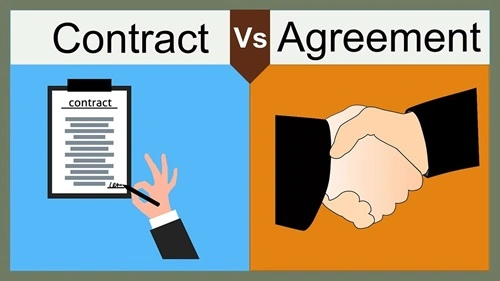In the realm of law and business, the terms “agreement” and “contract” are often used interchangeably, leading to confusion. While they may appear similar at first glance, they have distinct meanings and implications. Understanding the difference between the two is crucial for individuals and businesses to ensure proper legal compliance and effective communication. This article delves into the key differences between an agreement and a contract, exploring their definitions, features, and legal significance.
Definition of Agreement

An agreement is a mutual understanding or arrangement between two or more parties about their rights and responsibilities. It reflects a meeting of minds, where all parties agree on a specific course of action or terms. Importantly, an agreement does not necessarily have legal enforceability.
For example, if two friends agree to meet for dinner at a specific time, it constitutes an agreement. However, it lacks legal implications and cannot be enforced in a court of law if one party fails to show up.
Key characteristics of an agreement include:
- Mutual Consent: All parties must voluntarily agree to the terms.
- Intention: There may or may not be an intention to create legal obligations.
- Informality: Agreements can be informal and may not always require written documentation.
Definition of Contract
A contract is a legally binding agreement that is enforceable by law. It arises when an agreement fulfills certain legal criteria, such as consideration, lawful object, and the intention to create legal obligations. A contract is designed to provide remedies in case of breach and to ensure compliance with the agreed terms.
For instance, when you purchase a car, you sign a contract that binds both you and the seller to specific terms. If either party breaches the agreement, legal action can be taken.
Essential elements of a valid contract include:
- Offer and Acceptance: One party must make an offer, and the other must accept it unequivocally.
- Consideration: There must be an exchange of value, such as money, goods, or services.
- Capacity to Contract: Parties must have the legal capacity to enter into a contract (e.g., age of majority, mental competence).
- Lawful Object: The purpose of the contract must be legal and not against public policy.
- Certainty and Possibility: The terms of the contract must be clear, and the obligations must be possible to perform.
Key Differences Between Agreement and Contract
1. Legal Enforceability
- Agreement: Not all agreements are enforceable by law. An agreement becomes a contract only when it satisfies legal requirements.
- Contract: All contracts are agreements, but they are enforceable in a court of law.
2. Purpose
- Agreement: It is a broader term that encompasses any understanding between parties, regardless of legal intent.
- Contract: It is a subset of agreements specifically created with the intention of legal enforceability.
3. Scope
- Agreement: Includes informal arrangements such as social commitments or moral obligations.
- Contract: Includes legally binding obligations, primarily in commercial and business contexts.
4. Elements
- Agreement: Requires mutual consent between parties but may not involve consideration, legality, or formal documentation.
- Contract: Requires elements like consideration, legality, intention to create legal relations, and adherence to legal formalities.
5. Examples
- Agreement: An understanding between friends to split expenses for a trip.
- Contract: A lease agreement signed between a landlord and tenant for renting a property.
Legal Framework: Agreement vs. Contract
The distinction between agreements and contracts is governed by laws specific to each jurisdiction. In India, the Indian Contract Act, 1872 serves as the primary legal framework defining these terms:
- Agreement: According to Section 2(e) of the Act, an agreement is “every promise and every set of promises, forming consideration for each other.”
- Contract: Section 2(h) defines a contract as “an agreement enforceable by law.”
This differentiation underscores the requirement that an agreement must meet specific conditions to be classified as a contract under the law.
The Role of Intention
One of the most significant distinctions between an agreement and a contract lies in the intention of the parties involved. An agreement may or may not include the intention to create legal obligations. For example, casual agreements between friends or family members often lack such intention.
In contrast, a contract always involves an intention to create legal relations. This intention is a cornerstone of contract law, ensuring that parties understand the consequences of non-compliance.
Binding Nature and Remedies
Agreements that lack legal enforceability do not provide remedies in case of a breach. For instance, if someone agrees to lend you a book but fails to do so, you cannot sue them for breach of agreement.
On the other hand, contracts are legally binding, and a breach may lead to legal consequences such as compensation, specific performance, or cancellation of the contract. For example, if a service provider fails to deliver agreed-upon services, the client can seek remedies as stipulated in the contract.
Use Cases in Business and Law
- Business Context
- Agreements: Informal arrangements between business partners, such as understanding on roles and responsibilities.
- Contracts: Formal agreements like supply contracts, employment agreements, or partnership deeds.
- Personal Context
- Agreements: Promises made within a family or between friends, such as planning an event.
- Contracts: Loan agreements or rental agreements involving clear legal obligations.
The Transition from Agreement to Contract
An agreement becomes a contract when it meets the following criteria:
- A clear offer and acceptance are established.
- There is consideration (exchange of value) between parties.
- The purpose is lawful.
- Both parties intend to create a legal relationship.
- The terms are certain, and the obligations are possible to fulfill.
For example, a handshake agreement between two parties to sell a car transforms into a contract when documented in writing, signed, and includes agreed terms and consideration.
Common Misconceptions
- All Agreements Are Contracts This is incorrect. Only agreements that meet the legal criteria specified by law are considered contracts.
- Verbal Agreements Cannot Be Contracts Verbal agreements can be legally binding contracts if they satisfy the necessary conditions. However, proving their terms in court can be challenging.
- Contracts Always Require a Lawyer While legal assistance is beneficial, many contracts, such as purchase agreements or employment contracts, can be executed without legal intervention.
Conclusion
The difference between an agreement and a contract lies in their enforceability and purpose. While every contract is an agreement, not every agreement qualifies as a contract. Understanding this distinction is vital for navigating legal and business dealings effectively.
Agreements often reflect informal understandings that may or may not carry legal weight. In contrast, contracts are formalized agreements with legal implications, designed to ensure accountability and provide remedies in case of breach. By recognizing the nuances between these terms, individuals and businesses can safeguard their interests and make informed decisions in their professional and personal interactions.



